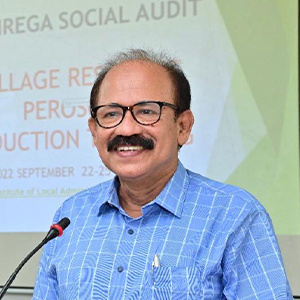




- STATE LEVEL WORKSHOP on “Exploring Opportunities for Extending Social Audit from MGNREGS to Other Development Programmes” on 11 JULY 2024 at Institute of Management in Government (IMG) Thiruvananthapuram
- മഹാത്മാഗാന്ധി ദേശീയ ഗ്രാമീണ തൊഴിലുറ പ്പ് പ2തി സോഷ്യല് ഓഡിറ്റ് വില്ലേജ് റിസോഴ്സ് പേഴ്സണ്മാരുടെ ഓഡിറ്റ് വൈദഗ്2്യം വളര് ത്തുന്നതിനുള്ള തുടര് പരിശീലനം

Sri. Pinarayi Vijayan
Hon. Chief Minister Kerala

Sri. M. B. Rajesh
Hon. Minister, LSGD, GoK

Sri. Puneeth Kumar IAS
Additional Chief Secretary, LSGD, GoK

Sri. Biju K. IAS
Chairman, Social Audit Society Kerala (Secretary, Public Works Department and Tourism, GoK)
Social Audit Unit Kerala
MGNSASK (Mahatma Gandhi NREGA Social Audit Society, Kerala) is the social audit society of Kerala. The unit functions as an independent society, registered under the Travancore – Cochin Charitable Societies Act, 1955 vide No. TVM/TC/123/2017 on 31st January 2017 namely Mahatma Gandhi NREGA Social Audit Society Kerala (MGNSASK) with the legal mandate to conduct social audit in the state as envisaged by MGNREGA Audit of Schemes Rules, 2011.
We work towards carrying forward the legacy of Kerala’s renowned democratic decentralization endeavor that started in 1996 by bringing about democratic accountability in the administration of development programmes and institutions in the state and local governance through social auditing.
Social Audit Kerala
MGNREGA
News & Updates
-
Induction Training for Village Resource PersonsFrom 21 to 24 August 2024 at CHASS Changanassery, Kottayam
-
Induction Training for Village Resource PersonsFrom 16 to 19 August 2024 at KILA Thrissur
-
Induction Training for Village Resource PersonsFrom 7 to 10 August 2024 at Sargalaya Arts and Craft Village, Iringal, Vadakara
-
Induction Training for Block Resource PersonsFrom 6 to 10 August 2024 at KILA CHRD Kottarakkara
-
Released the Annual Report 2022-23 of SAU Kerala
Objectives of Social Audit
- Ensuring the participation of all stakeholders in the planning, decision-making, implementation, monitoring and evaluation of Mahatma Gandhi NREGS.
- Ensuring public accountability and transparency in the implementation of projects under Mahatma Gandhi NREGS and the laws and policies related to Mahatma Gandhi NREGA.
- Ensuring the entitlements of the MGNREGS workers and setting up all worksite facilities for them.
- A fact-finding process by investigating through cross-verification of facts at work sites and duties and responsibilities of laborers involved in the scheme.
- Ensuring people’s participation in community development through Mahatma Gandhi NREG in the Grama Sabhas and Public hearings.
Mandate
Since, then the state began its journey of conducting fair and transparent social audits at the ward level by recruiting and training different levels of social audit resource persons, extending management, regulatory support with evaluation and feedback, and also setting in place a robust grievance redressal mechanism as envisaged in Mahatma Gandhi National Rural Employment Guarantee Act and Audit of Scheme Rules 2011. Apart from MGNREGS, the social audit unit also conduct social audits for other schemes like PM POSHAN, PMAY-G, Aarogya Keralam, Ayyankali Urban Employment Guarantee Scheme, etc.
















